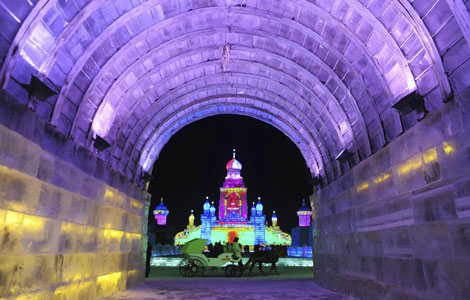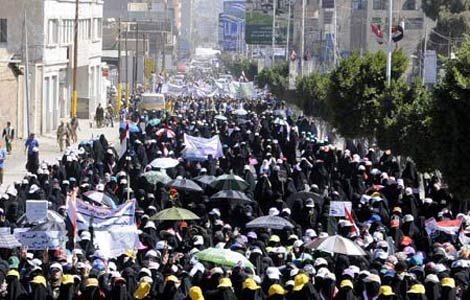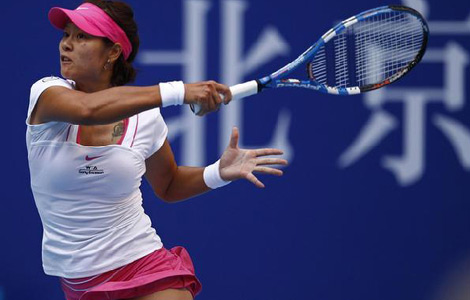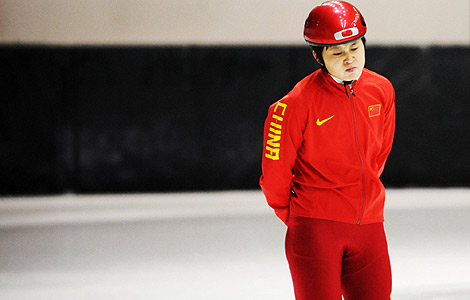Less popular sports take hold
Updated: 2011-12-24 14:24
(Xinhua)
|
|||||||||||
BEIJING - Wang Kaidong's face turned red when he launched an attack with a foil, and his mother watched his every move with a content smile on her face.
The seven-year-old had a 45-minute private fencing lesson and another 90-minute group combat lesson one recent afternoon at the Vango Fencing Club in Beijing.
As Chinese urbanites have become better-off in the recent years, they have shown a growing interest in traditionally less popular sports such as fencing and equestrian-related activities.
Wang's parents spend 6,000 yuan ($950) annually on Wang's group lessons, almost a month's salary for many Beijingers, and another 150 yuan for each session of private coaching.
But the sport's costs have not hampered its development in China.
Vango Club was founded in 2007 with only several dozen members. In less than five years, its enrollment has increased to more than 8,000 members. Two more Vango outlets will soon open in the southern cities of Foshan and Shenzhen.
"Vango is now the largest fencing club in the world!" said Cong Dawei, the assistant head coach. "We are thinking about starting a fencing league among all the clubs in China, so our members can have more competitions."
Chinese parents see the sport as a gentleman's game that can help build character, as it is often associated with knighthood and nobility.
"Fencing is a gentleman's game and I want my son to be a gentleman," Wang's mother Yang Ning said. "It is especially helpful for boys, as the sport is very competitive and it requires a brave and concentrated mind."
Meanwhile, equestrian sports also have noble and aristocratic connotations, and have sprung up in China in recent years, too. There are currently more than 300 equestrian clubs around the country, and 300,000 people are taking part in the sport.
Ten-year-old Wang Xinyue started her riding classes in Qiji Equestrian Club in Beijing during the May Day Holiday, and has had more than 30 riding sessions so far. She believes the horse is her good friend, and she pets it and feeds it a carrot after class.
"It is great fun. I like it very much," Wang said.
Wu Di, manager of Qiji, said that among its 300 members, one-third of beginners are parents and their kids. The rate tends to increase during summer vacation.
"The sport promotes children's physical development and is very effective in character building. Spending time with animals is beneficial to children," Wu said.
Parents say that the club offers a respite from their children's heavy homework loads, and that riding horses in the countryside can give them a chance to breathe fresh air, as well as teach them courage, responsibility and fulfillment.
In Qiji, the cost of hiring a coach can range from 100 and 300 yuan, depending on their experience.
As the number of people participating in the sport multiplies and more equestrian clubs pop up around China, more and more horses from around the world are being brought to the country.
Cheng Qing, the Secretary-General of the Chinese Equestrian Association, feels proud of the progress.
"With the development of the economy and the promotion of people's cultural lives, they have gradually learned that equestrianism combines movement with serenity. So the sport has great energy," Cheng said.
- Economic growth set to fall next year
- China, Japan keen to improve ties
- Police asked to give family notice of detention
- Former ROK first lady mourns Kim Jong-il
- 2,349 CPC officials violate house rules
- China stresses stable grain production
- Passengers make 290 million air trips in 2011
- TV tower fire culprit gets 20-year jail term
Hot Topics
HIV/AIDS, Egypt protest, Thanksgiving, climate change, global economic recovery, home prices, high-speed railways, school bus safety, Libya situation, Weekly photos
Editor's Picks

|

|

|

|

|

|







